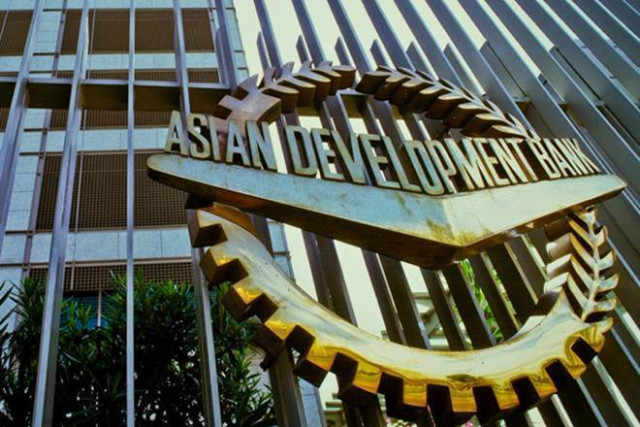Pakistan secures $1.5 billion ADB loan
Financing will be utilised for development of energy, infrastructure sectors

Pakistan took another $1.5 billion in loan from the Asian Development Bank (ADB) for the development of energy and infrastructure sectors, including $300 million in second budgetary support package that the Manila-based lender approved despite the first tranche of a similar amount going down the drain.
Federal Minister for Economic Affairs Omar Ayub Khan witnessed a signing ceremony for six financing agreements amounting to $1.54 billion between Pakistan and the ADB, stated the Ministry of Economic Affairs on Wednesday. In the past 24 hours, the federal cabinet and the government have endorsed $5.5 billion worth of lending agreements, highlighting the growing indebtedness of the country.
The cabinet on Tuesday gave ex-post facto approval to the highly expensive short-term commercial loans of $3.9 billion. Prime Minister Imran Khan had vowed to break the begging bowl before becoming chief executive of the country.
The fresh financing agreements included a $300 million policy-based loan to support financial, technical and governance reforms to strengthen Pakistan’s energy sector, said the ministry.
The $300 million loan has been extended under the second tranche of energy sector reforms programme after Pakistan agreed to increase electricity tariffs on an annual, quarterly and monthly basis. Implementation of the circular debt management plan is also part of the second tranche conditions.
ADB documents showed that the $300 million second tranche had been secured for financial sustainability of the power sector by controlling the accumulation of and reducing the circular debt, strengthening governance by implementing a road map for a competitive electricity market, appointing appellate tribunals, implementing multiyear tariffs and unbundling the gas segment.
As part of the programme conditions, Finance Adviser Shaukat Tarin last month assured the ADB board that the government would bring down the circular debt from Rs2.3 trillion to Rs1.850 trillion in June 2022 and further to Rs1.519 trillion in June 2023.
Tarin’s letter to the ADB board is tantamount to admitting that when the PTI government would complete its tenure, the level of circular debt would be roughly Rs400 billion higher than what it had inherited from the PML-N in June 2018.
The PTI government had promised to bring down the circular debt to zero by December 2020.
In December 2019, the ADB had approved a three-tranche lending programme to address financial, technical and governance deficits in the energy sector that adversely impacted the sector’s sustainability and affordability, and Pakistan’s fiscal balance and macroeconomic stability.
The conditions for $300 million of the first tranche were aimed at reducing the level of circular debt and improving the sector’s management and efficiency – the goals that could not be achieved.
The federal government on Tuesday transferred yet another Power Division secretary and brought in Asif Haider Shah in place of Ali Raza Bhutta.
Despite the $300 million going down the drain, the ADB has now approved another $300 million in policy loan to achieve almost similar objectives – making the power sector financially viable.
The economic affairs ministry said that both sides also signed an agreement for a $385 million loan to improve urban infrastructure in five cities of Khyber-Pakhtunkhwa; $235 million project loan to dualise the 222km Shikarpur-Rajanpur section of Indus Highway (N-55); and $603 million results-based lending programme to strengthen and expand the Ehsaas programme.
Two project readiness facilities for preparing the Kurram Tangi Integrated Water Resources Development Project worth $5 million and Khyber-Pakhtunkhwa Cities Improvement Investment Project Phase-II worth $15 million were also signed.
Minister for Economic Affairs stated that Khyber Pakhtunkhwa Cities Improvement Project will help provincial and city governments of Khyber Pakhtunkhwa Province to improve the livability of five cities namely Abbottabad, Kohat, Mardan, Mingora, and Peshawar by providing water supply, sewerage, solid waste management and green infrastructure.
It will also provide institutional support to improve service delivery and performance of municipal companies with a special focus on promoting gender-friendly municipal services through empowerment and capacity development. The project will benefit up to 3.5 million people in these five target cities of Khyber Pakhtunkhwa. The project also supports the government's development priorities and Prime Minister Imran Khan’s vision of Clean Green Pakistan.
Minister for Economic Affairs also highlighted that under the Central Asia Regional Economic Cooperation (CAREC) Corridor Development Investment Programme Tranche-II, a 222-KM Shikarpur-Rajanpur Section of Indus Highway (N-55) will be dualised (four-lane carriageway) which traverse Sindh and Punjab provinces on the western side of Indus River via Kandhkot, Kashmore and Rojhan.
The dualisation of the Indus Highway (N-55) will not only boost local economic activities but also promote intra/inter-regional trade and movement of people by improved connectivity and reduced travel time. Indus Highway provides another international corridor linking China, Afghanistan and their neighboring Central Asian countries to the Arabian Sea. In order to ensure the comfort and safety of road users, the section will be equipped with bus shelters, trauma centers and rest areas as well as road safety facilities, he added.
The Minister for Economic Affairs stated that the Integrated Social Protection Development Programme will support the government's efforts to implement the Ehsaas Programme including social protection and poverty reduction schemes in line with the vision of Prime Minister of Pakistan Imran Khan. Kurram Tangi Integrated Water Resources Development Project is one of the top priority projects in the erstwhile FATA which includes the construction of a dam with water storage facility, hydropower generation and construction/upgrading of irrigation system covering 140,000 hectares.
Published in The Express Tribune, December 23rd, 2021.
Like Business on Facebook, follow @TribuneBiz on Twitter to stay informed and join in the conversation.



















COMMENTS
Comments are moderated and generally will be posted if they are on-topic and not abusive.
For more information, please see our Comments FAQ